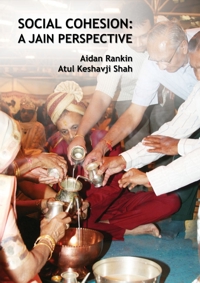One of the world’s oldest religions, Jainism, has as its primary philosophy ‘Ahimsa’ or ‘reverence for all living beings’. Its latest prophet (Tirthankara), Mahavira, was born in 599 BC in North East India. He was the 24th in the line of prophets and thus Jainism is a dharma of unique antiquity. It has had a major influence on the spread of non-violent values and practices in the entire history of India. Tirthankara means ‘ford-maker’ or ‘path-finder’, one who points the way to enlightenment. Dharma signifies both the underlying law of the universe and the individual’s path towards the truth. The idea of cosmic balance includes ecological sustainability.
Among the best known Jain scriptures are the Acharanga Sutra (Book of Good Conduct) and the Tattvartha Sutra (That Which Is). These works are presented in the crisp style of the Indian sutra tradition, as verses of philosophical import that act as points of reference for those who seek guidance n their journey towards truth. The Acharanga is one of eleven angas or ‘limbs’, which together form the ‘body’ of Jain ideas. The Angas were composed by learned followers of Mahavira in the centuries after his death. The Acharanga is the limb that refers to conduct (achara) and sets out explicitly the twin principles of non-violence and interconnectedness:
That which you consider worth destroying is (like) yourself.
That which you consider worth disciplining is (like) yourself.
That which you consider worth subjugating is (like) yourself.
That which you consider worth killing is (like) yourself.
The result of actions by you has to be borne by you, so do not destroy anything.
The Acharanga is regarded as the oldest written portion of the Jain canon, dated as far back as the fourth century BCE. The Tattvartha was composed somewhat later, in the second century CE, by the scholar and seer Umasvati. It presents in three hundred and fifty verses the Jain understanding of the nature of reality, and in particular the faith’s unique approach to karma and liberation, which are referred to below.
Britain today has a population of 35,000 Jains who have been brought up in this timeless living tradition. They are a highly educated, resourceful, well assimilated and cohesive community who enrich national life through their ethics, conduct, wisdom and character. In India, the Jains have a huge track record of community cohesion and social uplift over thousands of years. They have always been a minority, but have assimilated and integrated very well throughout history. We may say that cohesion is a genetic trait of Jains. Unfortunately, very little is known about this community and its values. In writing this paper, we are drawing upon this vast ocean of wisdom and experience and translating the message to modern day Britain.
The core philosophy of Ahimsa, which literally means non-violence, or abstention from harm, encourages respect for all living beings - irrespective of caste or creed, and more importantly, species. For them, human diversity is rooted in bio-diversity, and there is no difference between the two - one is an extension of the other. Thus difference is normal, difference is not to be feared, but instead loved and respected. Each soul (atman) is unique and equally worthy of dignity and respect. As a result, Jains have been practicing vegetarians for thousands of years and have a long track record of peaceful living and conduct. Women are accorded equal respect and status. Jain respect for humans has led them not only to assimilate with people from different backgrounds and beliefs, but also often to provide much needed leadership and vision to foster community cohesion.
Parasparopagraho Jivanam is a Jain maxim that means that all living beings are inter-dependent. Hence we are really not individuals but indivisibles, people who are inter-connected to one another and all life forms. All too often, this is forgotten and even in our practical actions, we act as if our actions have no impact on others. This leads to irresponsibility and recklessness. Instead, we need to encourage a culture of responsibility which recognises mutuality and enables people to see and understand the impact of their actions on others. Jains have always believed that endowed with superior intelligence and consciousness, the human being has the highest sense of responsibility and accountability to the planet. Arrogance and egoism should be replaced by humility and awe.
Other core values of Jain philosophy are Aparigraha (non-materialism), Asteya (non-stealing), Anekant (respect for alternative viewpoints), Brahmacharya (restraint of the senses), Satya (truth and integrity), Kshama (forgiveness) and Saiyam (self-discipline). The focus is on the combination of the three jewels - right knowledge, right vision and right conduct - to enable the soul to attain liberation and enlightenment. These values empower them to attain this ultimate goal.
Aparigraha literally means ‘non-possessiveness’. Although we may need material objects to live, we need not become possessive about our wealth and objects. Instead, we should live simply and in a detached way, ensuring that our energies are focused on building our own inner purity and spirit and experiencing inner fulfilment rather than the temporary pleasures which come from material possessions. Society needs to understand the limits of materialism and a culture of consumerism and greed. Materialism has a tendency to lead to selfishness and a ‘Me, I, Mine’ culture - which has no space for others, let alone any respect for their beliefs and viewpoints. Greed is a type of violence which leads to exploitation and deprives others of their rights to self-fulfilment. This is one of the root causes of a lack of community cohesion today.
Anekant is a scientific analysis of the many-sidedness of truth and its multiple dimensions and perspectives. It demonstrates that truth is relative to the perspective of the seer and so has a subjective character and is difficult to articulate objectively. It rejects absolutism and fundamentalism. Thus we should respect alternative viewpoints even when we disagree with them. This mindset cultivates an attitude of tolerance, openness and co-operation, which helps to build bridges rather than walls - cohesion rather than conflict. Brahmacharya explains that indulgence in sensual pleasures leads to a loss of self-control akin to permanent intoxication. Senses are there to allow us to experience and connect, but balance in everything is key. If humans learn to live with restraint and understand the nature and role of the senses, then we can attain true inner freedom. Otherwise, instead of becoming a master of one’s senses, one remains a slave to them and will never experience lasting freedom.
Kshama encourages the active giving and seeking of forgiveness from all living beings. It accepts that none of us is infallible and giving and receiving forgiveness enables us to clear our conscience and free ourselves from anger and blame toward others. It builds a positive outlook which encourages us to seek pathways and solutions at all times to build peaceful co-existence on planet Earth.
Satya forges a path of living with integrity where our conduct is synonymous with our words and thoughts. Truth should not merely be in words but implemented in lived reality. Honesty and sincerity are the practical manifestations of Satya and crime or theft of any kind is abhorred and prohibited. Satya helps us build a just society and encourages its citizens to abide by the laws.
Saiyam teaches us that self-discipline is the key to lasting freedom and happiness. In contrast to many modern notions of ‘freedom’, where there is a tendency for schools and parents not to discipline children, discipline is central to the building of character. Freedom to do what one wants when one wants to leads to bondage rather than liberation. It makes one seek external pleasures which never fulfil completely, and make one bonded to such objects and escapism. Unfortunately the word ‘discipline’ is too often confused with authoritarianism and harshness. But true discipline is the opposite, because it is based on nurturing and respect. It provides the framework of stability and trust in which self-discipline can be cultivated from within. Discipline, and self-discipline above all, helps sustain a viable community and society. Alcohol, drugs and other intoxicants reduce discipline and control of human actions and are actively discouraged. If only pubs and bars lie at the heart of an urban community, for example, and alcohol is their only real social ingredient, then there will be weak cohesion at best. A wider range of social activities, clubs and sports facilities are therefore vital ingredients of social cohesion and social solidarity. Their importance should never be underestimated by policy-makers. Another important aspect of Jain teaching is the concept of karma. As in other traditions of Indian origin, such as Hinduism and Buddhism, karma is the cosmic law of cause and effect, by which every action has consequences, some obvious, others more subtle. This does not merely apply to human acts, but to every action in the universe, direct or indirect, conscious or otherwise. Karma reminds us of the continuity between generations, evolutionary levels and different forms of life. In short, it is the connecting principle of the universe, by which everyone - and everything - is bound together.
The word karma has become well-known in western culture, but it is widely misunderstood and viewed with fascination or fear. Karma is often wrongly conflated with fatalism and destiny. This is at best a simplification, and it is especially mistaken when applied to the Jain view of karma. Jainism’s starting point is the individual conscience and awareness of karma enables us to make rational decisions and ethical choices. In Jainism, there are two broad categories of karma affecting the individual - negative and positive. Negative karma is accumulated through selfish, avaricious or violent actions which harm others (human or non-human) and so do injury to life, including one’s own. When one accumulates negative karma, one’s soul is held to be weighed down or imprisoned. This is because it limits our consciousness. It comes between us and our true selves because it makes us confuse underlying reality with trivial ambitions and transient material concerns. Negative karma includes malign thoughts and emotions, such as greed, anger and prejudice, which are counted as forms of violence. It is a vicious cycle of unreason which takes us out of harmony with our fellow humans, with the rest of nature and with our inner selves.
Positive karma, by contrast, is accumulated through benign, compassionate thoughts and actions, concern for others, by using one’s ability and resources for the common good. It arises from awareness that all life is connected and that every decision we make has consequences, especially for future generations. Positive karma can counteract the effects of negative karma and, Jains believe, point the way towards spiritual liberation. This liberation (which few completely achieve but all are encouraged to work towards) is freedom from all karmic influences and the attainment of pure consciousness as karmic bonds fall away. Liberation is true independence, true self-realisation. This is because the true self and the soul are one and the same. Liberation, or Moksha, is achieved through recognising the interdependence of all life and acting accordingly. Materialism and egoism, by contrast, create an illusion of “personal autonomy” or “empowerment” but are really a form of slavery. They destroy the true self and they do injury to others.
This discussion of karma might seem to represent the purely philosophical and speculative aspects of Jainism. However karma translates directly into practical experience because of the framework for living it provides. It makes us aware of the importance of careful action, and equally careful examination of our motives, so that we avoid doing harm to others even when we think we are doing them good. Karma reminds us of the continuity between past, present and future, of our responsibility to conserve resources and live at peace with others, not just our fellow humans. It requires us to not only minimise harm, but to use our intelligence in creative and compassionate ways. Above all, karma expresses our sense that we are a social animal with obligations to others, rather than an isolated unit of production and consumption. This sense inspires and underpins all forms of social cohesion.
British society has never been monochrome or homogenous in character. But today it is unquestionably more varied than previously, as diverse customs, faiths and ways of life encounter each other, interact and jostle for influence. The benefits of this change have been immense, and the successes more than compensate for any problems that have arisen. However there is also a quest - within all communities - for the elusive “shared values” that bind us together, a search for new points of reference to make sense of our lives.
It is here, perhaps, that the Jain tradition has most to contribute. Anekant, the concept of many-sidedness, is well suited to the demands of a multicultural society, because it asks us to recognise and respond to other viewpoints, seeing them as part of a larger reality than our own. Jainism is primarily concerned with balance - between the individual and society, rights and duties, human intelligence and the rhythms of nature. The Jain community does not seek “converts”, for that would be cultural arrogance of the worst kind. Yet the principles of careful action and social responsibility can still be peacefully imparted. In a society seeking cohesion, they strike a powerful chord.
 Aidan Rankin
Aidan Rankin
 Dr. Atul Keshavji Shah
Dr. Atul Keshavji Shah
